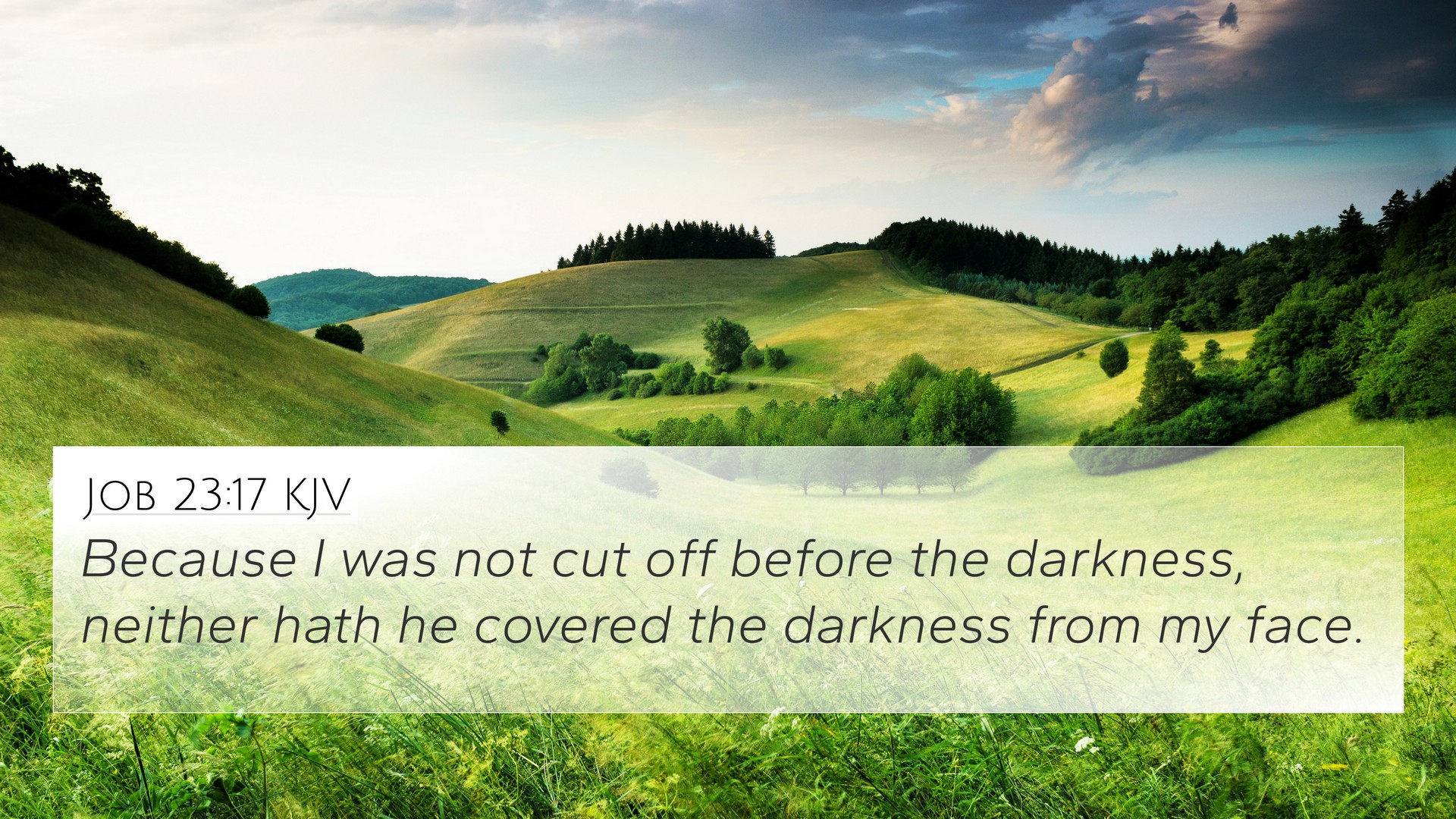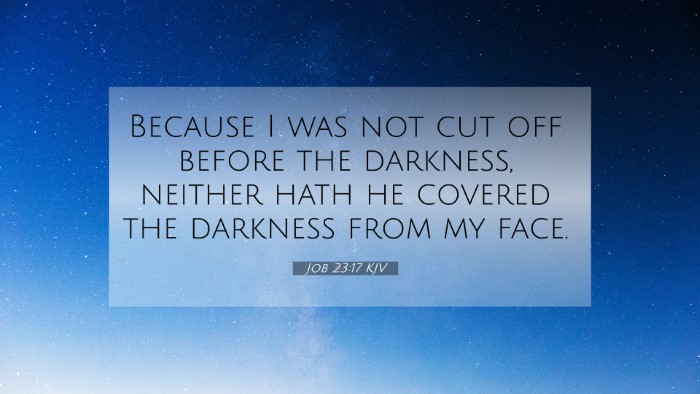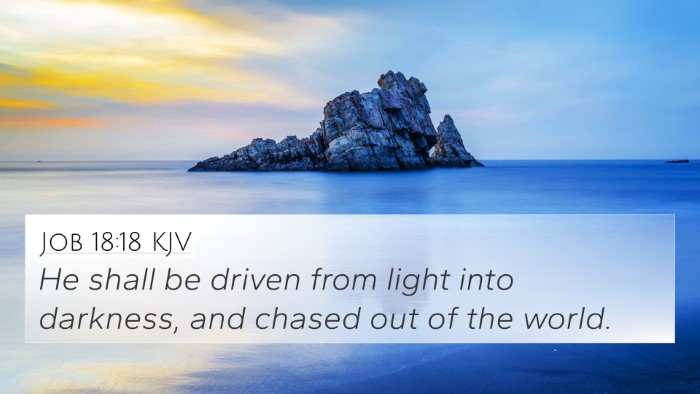Old Testament
Genesis Exodus Leviticus Numbers Deuteronomy Joshua Judges Ruth 1 Samuel 2 Samuel 1 Kings 2 Kings 1 Chronicles 2 Chronicles Ezra Nehemiah Esther Job Psalms Proverbs Ecclesiastes Song of Solomon Isaiah Jeremiah Lamentations Ezekiel Daniel Hosea Joel Amos Obadiah Jonah Micah Nahum Habakkuk Zephaniah Haggai Zechariah MalachiJob 23:17 Similar Verses
Job 23:17 Cross References
Because I was not cut off before the darkness, neither hath he covered the darkness from my face.
Uncover the Rich Themes and Topics of This Bible Verse
Listed below are the Bible themes associated with Job 23:17. We invite you to explore each theme to gain deeper insights into the Scriptures.
Job 23:17 Cross Reference Verses
This section features a detailed cross-reference designed to enrich your understanding of the Scriptures. Below, you will find carefully selected verses that echo the themes and teachings related to Job 23:17 KJV. Click on any image to explore detailed analyses of related Bible verses and uncover deeper theological insights.

Isaiah 57:1 (KJV) »
The righteous perisheth, and no man layeth it to heart: and merciful men are taken away, none considering that the righteous is taken away from the evil to come.
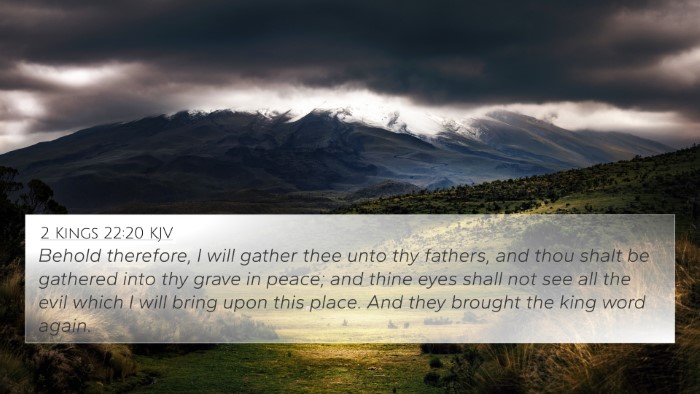
2 Kings 22:20 (KJV) »
Behold therefore, I will gather thee unto thy fathers, and thou shalt be gathered into thy grave in peace; and thine eyes shall not see all the evil which I will bring upon this place. And they brought the king word again.
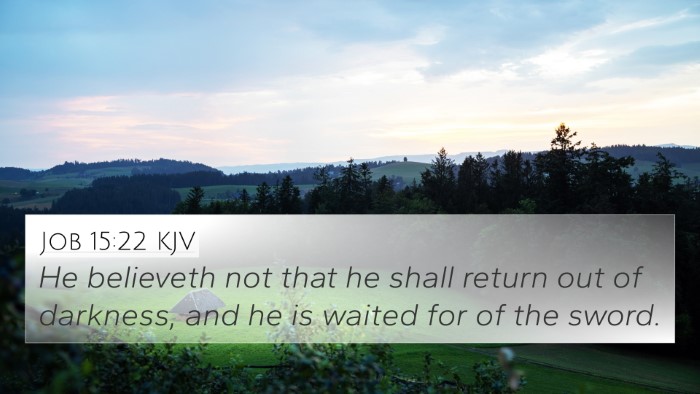
Job 15:22 (KJV) »
He believeth not that he shall return out of darkness, and he is waited for of the sword.

Job 6:9 (KJV) »
Even that it would please God to destroy me; that he would let loose his hand, and cut me off!
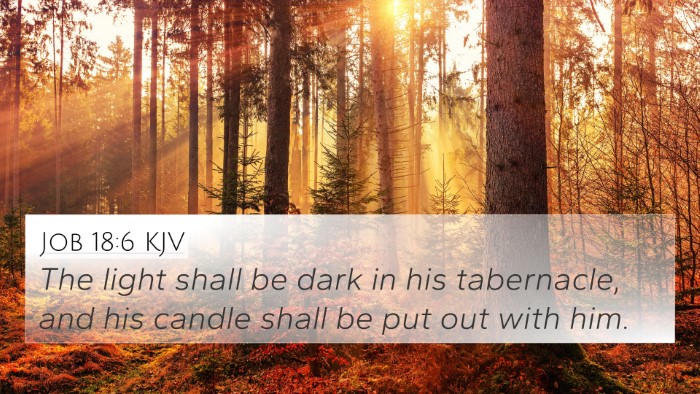
Job 18:6 (KJV) »
The light shall be dark in his tabernacle, and his candle shall be put out with him.
Job 23:17 Verse Analysis and Similar Verses
Understanding Job 23:17
Job 23:17 states: "Because I was not cut off before the darkness, neither hath he covered the darkness from my face." In this verse, Job expresses a profound sense of despair and a feeling of abandonment by God during his suffering. Despite his torment, he reflects on the thoughts of death and the afterlife, indicating how he has been preserved through his affliction.
Commentary Insights
Matthew Henry's Commentary:
- Henry points out the significant emotional turmoil Job is experiencing, suggesting that Job feels forsaken by God.
- The mention of darkness symbolizes not only physical death but also spiritual desolation.
- Henry emphasizes that Job is grappling with the idea that his suffering does not seem to yield a clear conclusion from God, showcasing the struggle of faith in adversity.
Albert Barnes' Notes:
- Barnes notes that Job realizes he has not been taken from life, despite numerous desires to understand his plight.
- The phrase "covered the darkness from my face" symbolizes the hidden will of God, which Job cannot discern in his suffering.
- This darkness symbolizes God's silence, which makes Job feel further isolated.
Adam Clarke's Commentary:
- Clarke highlights Job’s desperate wish to find God and to plead his case, indicating that he wants to have an audience with the Almighty.
- He emphasizes the importance of Job realizing he is still alive to vocalize his suffering, suggesting an opportunity for divine interaction.
- Clarke interprets "darkness" as both literal and metaphorical, conveying Job's loneliness and spiritual struggle.
Cross-References and Thematic Connections
Job 23:17 interlinks with several Bible verses that echo themes of suffering, divine silence, and the search for understanding in hardship:
- Psalms 22:1: "My God, my God, why hast thou forsaken me?" - A reflection of deep anguish and a feeling of divine abandonment.
- Isaiah 45:15: "Verily, thou art a God that hidest thyself." - Expresses the concept of God’s hiddenness amidst suffering.
- Psalm 30:7: "Lord, by thy favor, thou hast made my mountain to stand strong: thou didst hide thy face, and I was troubled." - Acknowledging the trouble that comes when one feels forsaken.
- 2 Corinthians 5:8: "We are confident, I say, and willing rather to be absent from the body, and to be present with the Lord." - Provides hope and understanding of what comes after suffering.
- Romans 8:28: "And we know that all things work together for good to them that love God." - Comforts those in suffering with the promise of divine purpose.
- Psalm 77:19: "Thy way is in the sea, and thy path in the great waters, and thy footsteps are not known." - Illustrates the mysterious ways of God during troubling times.
- Lamentations 3:20-22: "My soul hath them still in remembrance, and is humbled in me." - Acknowledging the weight of suffering and the fleeting hope of mercy.
Thematic Bible Verse Connections
This passage encourages us to explore the thematic connections across the Scriptures. Understanding Job's plight through the lens of God’s perceived silence allows readers to relate their experiences of struggle while seeking comfort in knowing biblical promises.
Through cross-referencing Biblical texts, believers can see the continuity of God's character amidst varied human experiences. Job 23:17 serves as a poignant reminder that while God may seem distant in times of pain, faith can illuminate our understanding of His ultimate plans.
For those interested in tools for Bible cross-referencing, it is essential to explore a Bible concordance or utilize a cross-reference guide that can provide insights into related scriptures and themes such as suffering, despair, and divine presence.
Conclusion
In conclusion, Job 23:17 serves as a crucial verse encapsulating the human experience of pain and the psychological struggle against divine silence. By cross-referencing with related verses, believers can establish a rich contextual understanding that enhances their spiritual journey and fortifies their faith amidst life's adversities.
